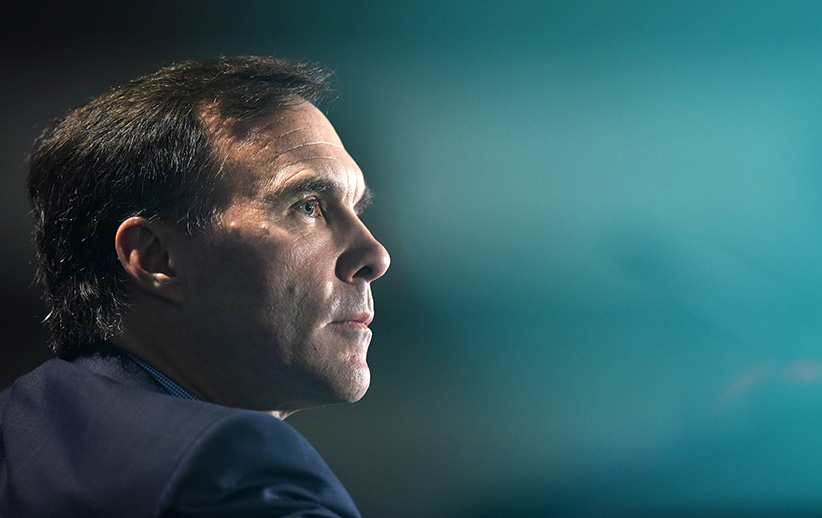How the Liberals might be able to salvage their tax reform plan
Changes to the tax code are genuinely needed, but the Trudeau government badly misread the public mood on the issue. It may not be too late, however
Minister of Finance Bill Morneau participates in a Q&A session at the Public Policy Forum’s Growth Summit on Wednesday, Oct. 12, 2016 in Ottawa. (Justin Tang/CP)
Share

I went to a town hall meeting on tax reform held recently by my local (Liberal) MP. It wasn’t pretty. Despite his repeated protestations that he was not there to “sell” the proposals and that he himself came from a small business family, he got a pretty rough ride. The hall was filled with small business owners of all types. They certainly did not look like a mob of wealthy fat cats scheming to dodge their fair share of taxes. They did, however, look very angry.
The federal government’s small business tax proposals are in trouble and although the government is unlikely to fall on the issue, the seats of a number of government MPs are likely in peril. As a veteran of past tax reform initiatives, I wondered how the government had come to generate such anger from small business owners and whether a much needed tax reform scheme could be rescued.
What went wrong? Most fundamentally, the proposals addressed a symptom, not the cause of the growth of small businesses owners’ use of legitimate means to reduce their tax bills. The government focussed on eliminating measures in an effort to level the playing field between incorporated small businesses on the one hand and unincorporated businesses and salaried employees on the other.
MORE: Canadians understand the proposed new tax rules—that’s why they’re mad
However, the underlying cause of the problem was ignored. Taxpayers are driven to find (costly) methods to reduce taxes when they believe those taxes are unfair. The top marginal tax rates of more than 50 percent that exist in some provinces are a good example. It’s hard to convince small business owners that if they work extra hard or take on additional risk to expand their businesses, that the government is entitled to more than half of the rewards. Saskatchewan’s NDP government learned this lesson the hard way in the 1990s and moved decisively to restore a measure of fairness by reducing top marginal tax rates in their 2000 tax reform.
The government’s introduction of the proposals was also problematic. Dumping them out in the dead of summer with only friendly academics to support them suggests that the government did not understand what lay further down the track. Allocating only a month of the fall for consultation made the proposals seem rushed and ill-considered.
Finally, portraying the debate as a conflict between wealthy tax dodgers and the hard working middle class was divisive and appeared hypocritical when it was later suggested that both the Prime Minister and Minister of Finance had themselves benefited from tax planning measures. While sometimes politically effective in the short run, we have only to look at politics in the U.S. to see the long term effects of setting one group in society against another.
MORE: How Bill Morneau found himself at war with small business
Can tax reform be rescued? In my view the answer is yes, although not without first returning to the drawing board. Giving the timing of the next general election, this means making tax reform an agenda item for the government’s second mandate .
First, the reform should be comprehensive enough to deal with the fundamental issue of punitive marginal tax rates on high-income earners. It could greatly simplify business taxation by eliminating the small business tax rate and dividend rules altogether and providing incentives for small business owners to invest in their businesses. Measures such as these would simplify the tax system rather than make it more complicated as the current proposals do. Further, they would preserve the incentives for small business owners to work hard and take the risks needed to grow their businesses.
Most importantly, a comprehensive reform would give the government the scope to design a balanced package that addressed some of everyone’s concerns rather than pitting one group against another. It would give the government time to build consensus and deliver the reforms in a period of budget balance when the pressure to maximize revenue was reduced.
When you find oneself in a hole, rule #1 is to stop digging. If they are truly committed to reforming Canada’s tax system, the government should step back and take the time to do it right.
Paul Boothe is a Fellow of the Institute for Competitiveness and Prosperity. His career has including serving as Saskatchewan Deputy Minister of Finance and Federal Associate Deputy Minister of Finance.
MORE ABOUT SMALL BUSINESS:
- The golden rules of good web design
- Cyber-security gaps that small businesses need to watch out for
- 5 ways small business owners can tap the cloud
- Seven telltale signs your employee is looking for a new job elsewhere
- How to negotiate smarter, more aggressive business deals
- Why you need to build a company that can run without you
- How to turn your best customers into an amazing marketing resource
- Focus on your existing clients to master the art of upselling